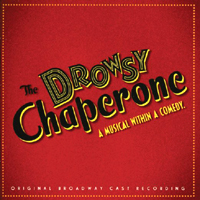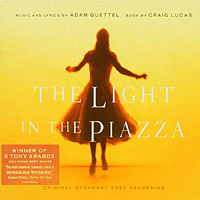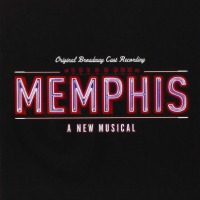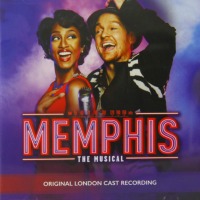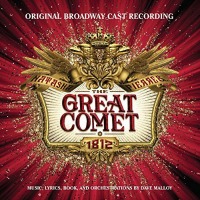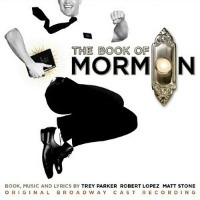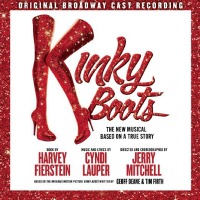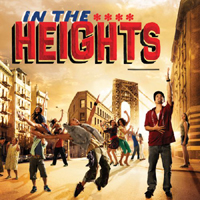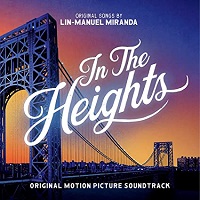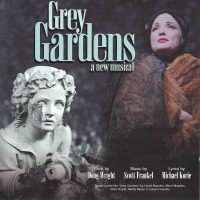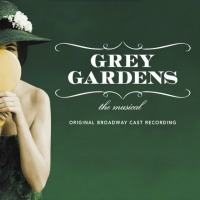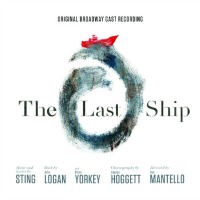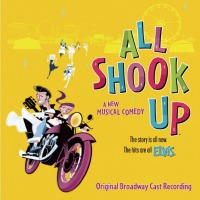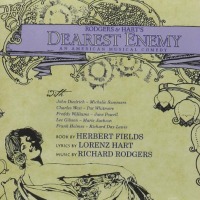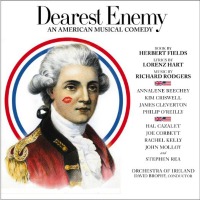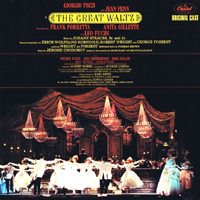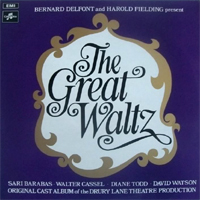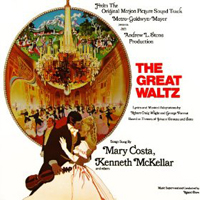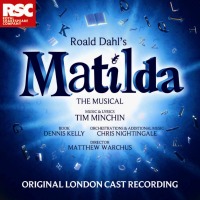 Original London Cast, 2013 (RSC)
Original London Cast, 2013 (RSC)  (5 / 5) This recording reflects the Royal Shakespeare Company’s world premiere production of the musical Matilda, based on Roald Dahl’s book about a precocious, five-year-old British girl. A rather dark, cerebral show that also happens to be wickedly funny, charming, and moving, Matilda is in some ways the antidote to Annie; whereas the redheaded orphan patiently waited for the sun to come out tomorrow, Matilda fights to change her life and the bad deck of cards she has been dealt, including a moronic family that doesn’t care about her and a fearsome headmistress who hates children in general. For his first musical theater work, Australian comedian Tim Minchin has written a stellar score, one with playfully odd melodies and deliciously smart lyrics that fit the wonderfully twisted world of Dahl perfectly. There’s much fun to be had in “Naughty,” “Telly,” and other songs; and when Matilda shows its heart, it thankfully doesn’t wear it on its sleeve like so many children-centered shows. Songs such as “Quiet” and “My House” are simple and understated (a rarity in modern musical theater), allowing the actors to live in them and explore their dramatic potential. Christopher Nightingale’s orchestrations are by turns playful (“Miracle”), funky (“Revolting Children”), and beautiful (“I’m Here”). The cast of this recording is wonderful, with three young performers covering different tracks of Matilda (because they rotated in the role on stage). Special praise goes to Bertie Carvel, who plays the headmistress, Miss Trunchbull. Avoiding camp, Carvel instead performs like a dry, British piranha, making the character’s evilness funny yet still menacing. Perhaps the greatest song on this album is “When I Grow Up, ” by far the most uplifting number in the score: “When I grow up / I will be brave enough to fight the creatures / That you have to fight beneath the bed / Each night to be a grown up.” It reveals that, for all its cleverness and mischief, Matilda is at its core an optimistic show. — Matt Koplik
(5 / 5) This recording reflects the Royal Shakespeare Company’s world premiere production of the musical Matilda, based on Roald Dahl’s book about a precocious, five-year-old British girl. A rather dark, cerebral show that also happens to be wickedly funny, charming, and moving, Matilda is in some ways the antidote to Annie; whereas the redheaded orphan patiently waited for the sun to come out tomorrow, Matilda fights to change her life and the bad deck of cards she has been dealt, including a moronic family that doesn’t care about her and a fearsome headmistress who hates children in general. For his first musical theater work, Australian comedian Tim Minchin has written a stellar score, one with playfully odd melodies and deliciously smart lyrics that fit the wonderfully twisted world of Dahl perfectly. There’s much fun to be had in “Naughty,” “Telly,” and other songs; and when Matilda shows its heart, it thankfully doesn’t wear it on its sleeve like so many children-centered shows. Songs such as “Quiet” and “My House” are simple and understated (a rarity in modern musical theater), allowing the actors to live in them and explore their dramatic potential. Christopher Nightingale’s orchestrations are by turns playful (“Miracle”), funky (“Revolting Children”), and beautiful (“I’m Here”). The cast of this recording is wonderful, with three young performers covering different tracks of Matilda (because they rotated in the role on stage). Special praise goes to Bertie Carvel, who plays the headmistress, Miss Trunchbull. Avoiding camp, Carvel instead performs like a dry, British piranha, making the character’s evilness funny yet still menacing. Perhaps the greatest song on this album is “When I Grow Up, ” by far the most uplifting number in the score: “When I grow up / I will be brave enough to fight the creatures / That you have to fight beneath the bed / Each night to be a grown up.” It reveals that, for all its cleverness and mischief, Matilda is at its core an optimistic show. — Matt Koplik
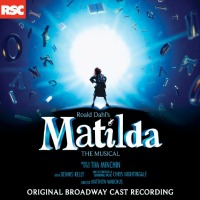 Original Broadway Cast, 2013 (Yellow Sound Label/Broadway Records)
Original Broadway Cast, 2013 (Yellow Sound Label/Broadway Records)  (3 / 5) Here we have a rare situation: a London cast album is actually preferable to the recording of the Broadway incarnation. While all of the new performers are as talented as their predecessors, and much is the same in terms of material (there is more dialogue included on the OBC recording, and there are some minor lyric changes), something is slightly off here. In trying to “Broadway-ize” the piece, Matilda’s creators made the show a difficult listening experience. Perhaps the biggest problem is/are the new orchestrations by Christopher Nightingale; brassy and brash, they frequently overpower the singers (even on the recording), making it hard to understand Minchin’s brilliant lyrics. Perhaps to compete with the orchestra, the performances of this cast are broader and less human than those of the British company. Even Bertie Carvel, repeating his role of Miss Trunchball, seems less funny and more fidgety than before. On the bright side, Lauren Ward as Miss Honey, also returning from the London production, is just as touching and perhaps even stronger vocally than on the previous recording. She is the sole caring adult character, and the beating heart of the show. All of the Matildas here — four of them, as opposed to the British three — are smart actresses and talented singers. Thankfully, for their tracks, Nightingale chose to remain faithful to his original orchestrations. — M.K.
(3 / 5) Here we have a rare situation: a London cast album is actually preferable to the recording of the Broadway incarnation. While all of the new performers are as talented as their predecessors, and much is the same in terms of material (there is more dialogue included on the OBC recording, and there are some minor lyric changes), something is slightly off here. In trying to “Broadway-ize” the piece, Matilda’s creators made the show a difficult listening experience. Perhaps the biggest problem is/are the new orchestrations by Christopher Nightingale; brassy and brash, they frequently overpower the singers (even on the recording), making it hard to understand Minchin’s brilliant lyrics. Perhaps to compete with the orchestra, the performances of this cast are broader and less human than those of the British company. Even Bertie Carvel, repeating his role of Miss Trunchball, seems less funny and more fidgety than before. On the bright side, Lauren Ward as Miss Honey, also returning from the London production, is just as touching and perhaps even stronger vocally than on the previous recording. She is the sole caring adult character, and the beating heart of the show. All of the Matildas here — four of them, as opposed to the British three — are smart actresses and talented singers. Thankfully, for their tracks, Nightingale chose to remain faithful to his original orchestrations. — M.K.
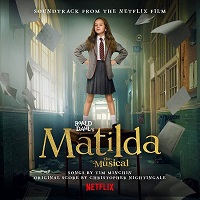 Film Soundtrack, 2022 (Masterworks Broadway)
Film Soundtrack, 2022 (Masterworks Broadway)  (4 / 5) When Matilda was being developed as a film, the entire original creative team was brought on to head the adaptation, which turned out well. Extremely well. As evidenced by this soundtrack album, Roald Dahl’s Matilda The Musical — the official title given to the movie by its distributor, Netflix — is just as sweet, edgy and unapologetically weird as the stage version. Christopher Nightingale has expanded his original orchestrations, and this recording is mixed in such a way that those orchestrations are not overwhelming, as they sometimes are on the Broadway cast album. Also, a much larger chorus of child actors bolsters major ensemble numbers such as “When I Grow Up” and “Revolting Children.” Since this is a movie with no rigorous, eight-shows-a-week performance schedule, only one actress is called on for the title role: 11-year-old Alisha Weir, who displays a perfect balance of precociousness and innocence as Matilda. In a departure from the stage version’s British panto approach to the character Trunchbull, Emma Thompson has stepped into the evil headmistress’ shoes. More overtly menacing than Bertie Carvel, Thompson appears game for anything and throws herself into the role, giving “The Hammer” and “The Smell of Rebellion” the proper mix of danger and hilarity that they require. Lashana Lynch is a lovely Miss Honey, making the most of “My House” and “Still Holding My Hand,” an effective new finale that Tim Minchin wrote for the film as a duet between Miss Honey and Matilda. There are some minor gripes with this recording: Though the cutting of the songs “Loud” and “Telly” isn’t an offensive choice, Andrea Riseborough and Stephen Graham make such a strong impression as Matilda’s horrible parents in “Miracle” that one wishes they had more opportunities to shine. And while the soundtrack includes the music for each of Matilda’s chapters on the Acrobat and Escapologist story, for some reason it doesn’t include any of Weir’s narration — a mistake, as the tracks now play more like background music than theatrical storytelling. So in order to hear Weir’s charming performance of these stories, you’ll have to watch the movie, which isn’t a hardship by any means. — M.K.
(4 / 5) When Matilda was being developed as a film, the entire original creative team was brought on to head the adaptation, which turned out well. Extremely well. As evidenced by this soundtrack album, Roald Dahl’s Matilda The Musical — the official title given to the movie by its distributor, Netflix — is just as sweet, edgy and unapologetically weird as the stage version. Christopher Nightingale has expanded his original orchestrations, and this recording is mixed in such a way that those orchestrations are not overwhelming, as they sometimes are on the Broadway cast album. Also, a much larger chorus of child actors bolsters major ensemble numbers such as “When I Grow Up” and “Revolting Children.” Since this is a movie with no rigorous, eight-shows-a-week performance schedule, only one actress is called on for the title role: 11-year-old Alisha Weir, who displays a perfect balance of precociousness and innocence as Matilda. In a departure from the stage version’s British panto approach to the character Trunchbull, Emma Thompson has stepped into the evil headmistress’ shoes. More overtly menacing than Bertie Carvel, Thompson appears game for anything and throws herself into the role, giving “The Hammer” and “The Smell of Rebellion” the proper mix of danger and hilarity that they require. Lashana Lynch is a lovely Miss Honey, making the most of “My House” and “Still Holding My Hand,” an effective new finale that Tim Minchin wrote for the film as a duet between Miss Honey and Matilda. There are some minor gripes with this recording: Though the cutting of the songs “Loud” and “Telly” isn’t an offensive choice, Andrea Riseborough and Stephen Graham make such a strong impression as Matilda’s horrible parents in “Miracle” that one wishes they had more opportunities to shine. And while the soundtrack includes the music for each of Matilda’s chapters on the Acrobat and Escapologist story, for some reason it doesn’t include any of Weir’s narration — a mistake, as the tracks now play more like background music than theatrical storytelling. So in order to hear Weir’s charming performance of these stories, you’ll have to watch the movie, which isn’t a hardship by any means. — M.K.
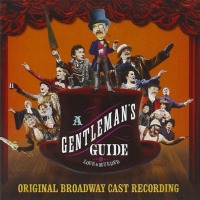 Original Broadway Cast, 2014 (Ghostlight)
Original Broadway Cast, 2014 (Ghostlight)  (3 / 5) Based on a novel by Roy Horniman that also inspired the film Kind Hearts and Coronets (1949), A Gentleman’s Guide to Love and Murder is pure wit and charm, but at a slight cost. The musical tells of an English Everyman, Monty Navarro, who discovers that he’s an heir to the prestigious D’Ysquith family’s fortune and then schemes to bump off each member of the family who stands in the line of succession before him. Though this may sound like nasty stuff, songwriters Robert L Freedman and Steven Lutvak present the story in a highly affected, proper-British, light-operetta manner: Agatha Christie meets Gilbert and Sullivan meets Oscar Wilde. They succeeded in making a fun and clever musical, one for which Lutvak composed many hummable melodies and, with Freedman, some exceptionally witty lyrics. Yet the cast album is a bit of a slow burn for the listener; early songs such as “You’re a D’ysquith” and “Foolish to Think” demonstrate Lutvak and Freedman’s difficulty in creating a strong narrative structure for much of the show’s first act. But as Monty (here played with dewy innocence by Bryce Pinkham) gains more confidence with his schemes, so does the show, and by the time we get to the door-slamming farce “I’ve Decided to Marry You” in Act Two, A Gentleman’s Guide to Love and Murder has risen from commendably intelligent to wonderfully hilarious. The recording boasts a stellar cast: Pinkham glides easily through the score with his silken voice, Lisa O’Hare is perfect as the shallow Sibella, and Lauren Worsham brings operatic flair to the role of the goodhearted Phoebe. Best of all is Jefferson Mays, clearly having a ball playing all eight moribund members of the D’Ysquith family. (This device was carried over from Kind Hearts and Coronets, in which Alec Guinness plays the victims.) With sophisticated yet daffy orchestrations by Jonathan Tunick to boot, this album offers a great deal of fun to any musical theater fan who’s willing to put in the time and listen through to the end. — Matt Koplik
(3 / 5) Based on a novel by Roy Horniman that also inspired the film Kind Hearts and Coronets (1949), A Gentleman’s Guide to Love and Murder is pure wit and charm, but at a slight cost. The musical tells of an English Everyman, Monty Navarro, who discovers that he’s an heir to the prestigious D’Ysquith family’s fortune and then schemes to bump off each member of the family who stands in the line of succession before him. Though this may sound like nasty stuff, songwriters Robert L Freedman and Steven Lutvak present the story in a highly affected, proper-British, light-operetta manner: Agatha Christie meets Gilbert and Sullivan meets Oscar Wilde. They succeeded in making a fun and clever musical, one for which Lutvak composed many hummable melodies and, with Freedman, some exceptionally witty lyrics. Yet the cast album is a bit of a slow burn for the listener; early songs such as “You’re a D’ysquith” and “Foolish to Think” demonstrate Lutvak and Freedman’s difficulty in creating a strong narrative structure for much of the show’s first act. But as Monty (here played with dewy innocence by Bryce Pinkham) gains more confidence with his schemes, so does the show, and by the time we get to the door-slamming farce “I’ve Decided to Marry You” in Act Two, A Gentleman’s Guide to Love and Murder has risen from commendably intelligent to wonderfully hilarious. The recording boasts a stellar cast: Pinkham glides easily through the score with his silken voice, Lisa O’Hare is perfect as the shallow Sibella, and Lauren Worsham brings operatic flair to the role of the goodhearted Phoebe. Best of all is Jefferson Mays, clearly having a ball playing all eight moribund members of the D’Ysquith family. (This device was carried over from Kind Hearts and Coronets, in which Alec Guinness plays the victims.) With sophisticated yet daffy orchestrations by Jonathan Tunick to boot, this album offers a great deal of fun to any musical theater fan who’s willing to put in the time and listen through to the end. — Matt Koplik

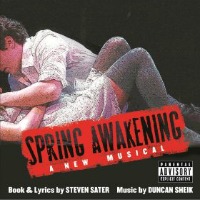
 (4 / 5) Even with the success of such shows as Hair and Rent, the original pop/rock musical theater score has had a spotty history on Broadway, but it saw a major comeback in 2006 with the raw and highly charged Spring Awakening. Based on Frank Wedekind’s expressionist play, the musical tells of young teenagers in 19th century Germany on the verge of sexuality, and the adults who refuse to explain to them what their newfound urges mean. On stage, Spring Awakening crackled and even exploded with energy, but while the cast album offers a pristine presentation of the score, it lacks some of the energy and spirit that made the show itself so moving. The cast — including future stars Jonathan Groff, Lea Michele, and John Gallagher, Jr. — still provides impressive vocals, but they are less expressive than they were on stage. “My Junk,” “Totally F****d,” and a few other high-powered songs lose some of their edge, although the quieter, more intimate numbers (“Whispering, ” “The Guilty Ones”) remain haunting. In truth, if any show called for a live cast recording, it was this one. Still, the Duncan Sheik-Steven Sater score is exceptionally strong. Sheik has provided many gorgeous, infectious melodies and orchestrated them well to season the score’s alternative rock sensibility with small nods to the show’s 19th German setting. Sater’s lyrics have a flair for the poetic, even if there are some frustrating false rhymes (e.g. “sweet and unknown/longing for a home” “all this/my lips”). To date, this is the only cast album of Spring Awakening, and it’s a good one. But let’s hope that future recordings capture a bit more of the show’s spark. — Matt Koplik
(4 / 5) Even with the success of such shows as Hair and Rent, the original pop/rock musical theater score has had a spotty history on Broadway, but it saw a major comeback in 2006 with the raw and highly charged Spring Awakening. Based on Frank Wedekind’s expressionist play, the musical tells of young teenagers in 19th century Germany on the verge of sexuality, and the adults who refuse to explain to them what their newfound urges mean. On stage, Spring Awakening crackled and even exploded with energy, but while the cast album offers a pristine presentation of the score, it lacks some of the energy and spirit that made the show itself so moving. The cast — including future stars Jonathan Groff, Lea Michele, and John Gallagher, Jr. — still provides impressive vocals, but they are less expressive than they were on stage. “My Junk,” “Totally F****d,” and a few other high-powered songs lose some of their edge, although the quieter, more intimate numbers (“Whispering, ” “The Guilty Ones”) remain haunting. In truth, if any show called for a live cast recording, it was this one. Still, the Duncan Sheik-Steven Sater score is exceptionally strong. Sheik has provided many gorgeous, infectious melodies and orchestrated them well to season the score’s alternative rock sensibility with small nods to the show’s 19th German setting. Sater’s lyrics have a flair for the poetic, even if there are some frustrating false rhymes (e.g. “sweet and unknown/longing for a home” “all this/my lips”). To date, this is the only cast album of Spring Awakening, and it’s a good one. But let’s hope that future recordings capture a bit more of the show’s spark. — Matt Koplik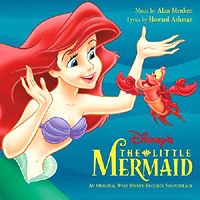
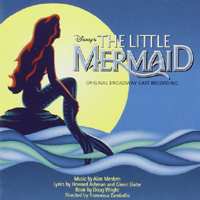
 (1 / 5) Howard Ashman sadly died at the height of his career, and he never saw any of his work with Alan Menken make it to Broadway. The legacy he left behind may be relatively small, but it is substantial in quality and much beloved. When Disney brought Beauty and the Beast to the stage with financially successful results, it was only a matter of time before The Little Mermaid, the movie that started it all, would make the transition as well. Unfortunately, in this case, Disney should have left well enough alone. With Ashman gone, Glenn Slater was brought in to contribute lyrics for new songs to expand the score for a full-length stage musical, and while he managed to come up with a few good fish puns, none of his work here matches the heart and inventiveness of Ashman’s work. Menken wrote some lovely melodies for the additional songs, though some of them are recycled from incidental music heard in the movie. The cast — Sierra Boggess, Sean Palmer, Sherie Rene Scott, Tituss Burgess, Norm Lewis, et al. — is talented and, in a few cases, vocally superior to their film counterparts, but most tend to go for vocal tricks, making the majority of the score sound over-sung. While Danny Troob’s orchestrations add the necessary flashes of Broadway brass to the Menken-Ashman material without going overboard, they don’t bring as much flair to the Broadway additions. Even though this recording has more songs and offers vocal flair from some Broadway favorites, you’re better off sticking to the movie soundtrack. — M.K.
(1 / 5) Howard Ashman sadly died at the height of his career, and he never saw any of his work with Alan Menken make it to Broadway. The legacy he left behind may be relatively small, but it is substantial in quality and much beloved. When Disney brought Beauty and the Beast to the stage with financially successful results, it was only a matter of time before The Little Mermaid, the movie that started it all, would make the transition as well. Unfortunately, in this case, Disney should have left well enough alone. With Ashman gone, Glenn Slater was brought in to contribute lyrics for new songs to expand the score for a full-length stage musical, and while he managed to come up with a few good fish puns, none of his work here matches the heart and inventiveness of Ashman’s work. Menken wrote some lovely melodies for the additional songs, though some of them are recycled from incidental music heard in the movie. The cast — Sierra Boggess, Sean Palmer, Sherie Rene Scott, Tituss Burgess, Norm Lewis, et al. — is talented and, in a few cases, vocally superior to their film counterparts, but most tend to go for vocal tricks, making the majority of the score sound over-sung. While Danny Troob’s orchestrations add the necessary flashes of Broadway brass to the Menken-Ashman material without going overboard, they don’t bring as much flair to the Broadway additions. Even though this recording has more songs and offers vocal flair from some Broadway favorites, you’re better off sticking to the movie soundtrack. — M.K.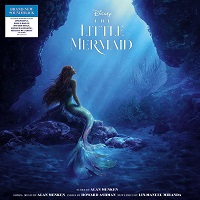

 (2 / 5) Based on the film written by Lee Hall, who did double duty for the stage musical as librettist and lyricist, Billy Elliot tells of a Northern English boy who discovers a love for ballet but has to hide it from his family — including his father and brother, who are on strike with the miner’s union at the height of Thatcherism. A smash hit in London (this cast album represents that production) and on Broadway, Billy Elliot was a moving, theatrically exciting piece due in large part to its thrilling staging by director Stephen Daldry, who also directed the film, and choreographer Peter Darling. What becomes clear on the cast album, however, is the obstacle that Hall and Elton John faced with this project: How does one write a compelling musical theater score when your leading character only feels comfortable expressing himself through dance? Their answer was to create a score that more or less provided a platform for Daldry and Darling to leap from. This is not to say that the songs are bad; they do exactly what they need to do. Without the umbrella of Disney, Elton John produced some inventive melodies (e.g., “Solidarity”) that are given extra character by Martin Koch’s orchestrations, even if John occasionally tends to lean back into his specialty of pop power ballads that don’t quite fit the piece. Hall, a first time lyricist, does an admirable job of keeping the songs in the language of the working class characters. Due to the physical demands of the title role, three young actors rotated as Billy in the original London production (and on Broadway), though only one, Liam Mower, is heard on this recording. Mower does a fine job, as does the rest of the cast, most notably a crackling Hayden Gwynne as the dance teacher who guides Billy out of his shell. Listeners who haven’t seen the show may wonder why Billy Elliot was such a phenomenon; the answer is that this musical, even more than most others, truly needs to be seen to be experienced. — Matt Koplik
(2 / 5) Based on the film written by Lee Hall, who did double duty for the stage musical as librettist and lyricist, Billy Elliot tells of a Northern English boy who discovers a love for ballet but has to hide it from his family — including his father and brother, who are on strike with the miner’s union at the height of Thatcherism. A smash hit in London (this cast album represents that production) and on Broadway, Billy Elliot was a moving, theatrically exciting piece due in large part to its thrilling staging by director Stephen Daldry, who also directed the film, and choreographer Peter Darling. What becomes clear on the cast album, however, is the obstacle that Hall and Elton John faced with this project: How does one write a compelling musical theater score when your leading character only feels comfortable expressing himself through dance? Their answer was to create a score that more or less provided a platform for Daldry and Darling to leap from. This is not to say that the songs are bad; they do exactly what they need to do. Without the umbrella of Disney, Elton John produced some inventive melodies (e.g., “Solidarity”) that are given extra character by Martin Koch’s orchestrations, even if John occasionally tends to lean back into his specialty of pop power ballads that don’t quite fit the piece. Hall, a first time lyricist, does an admirable job of keeping the songs in the language of the working class characters. Due to the physical demands of the title role, three young actors rotated as Billy in the original London production (and on Broadway), though only one, Liam Mower, is heard on this recording. Mower does a fine job, as does the rest of the cast, most notably a crackling Hayden Gwynne as the dance teacher who guides Billy out of his shell. Listeners who haven’t seen the show may wonder why Billy Elliot was such a phenomenon; the answer is that this musical, even more than most others, truly needs to be seen to be experienced. — Matt Koplik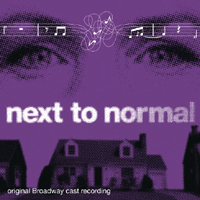
 (5 / 5) If Spring Awakening marked the successful comeback of the original pop/rock musical theater score, then Next to Normal helped insure its future. Part of the reason for the show’s success is that, despite its vibrant energy, it’s a very intimate piece that wears its large heart earnestly on its sleeve. The musical tells of the inner turmoil of a suburban family due to the mental instability of the mother, Diana, who has struggled with bipolar disorder ever since a traumatizing event years earlier: Her son, Gabe, whom she still imagines to be present, died when he was a baby. Although the plot at times borders on being that of a Lifetime Movie, the smart, pulsating score, given a crisp representation on this recording, keeps Next to Normal fresh and inventive. Brian Yorkey’s lyrics are strong and well defined, often bringing a touch of humor to cut the tension in the plot (for example, “My Psychopharmacologist and I”). Tom Kitt composed a score with both fire (“You Don’t Know,” “Didn’t I See This Movie”) and sweet sadness (“I Miss the Mountains”) that he orchestrated excellently with Michael Starobin, making the work electric yet still inherently theatrical. The cast, on the whole, is excellent. Alice Ripley tears into the role of Diana with an abandon that’s fearless, thrilling and at times unnerving. Occasionally, the performer seems so at one with the part that you might fear she won’t even make it to the end of the number — but she always does. J. Robert Spencer is very moving as the silently suffering husband, Dan, and so is Jennifer Damiano as daughter Natalie. Because of the surprises in the plot, listeners who haven’t seen the show will find it especially important to read the synopsis included in the CD booklet in order to make full sense of the story and songs such as “I’m Alive” and “There’s a World,” both sung by Gabe (Aaron Tveit). But they’ll have no problem understanding the emotional potency of each song. — Matt Koplik
(5 / 5) If Spring Awakening marked the successful comeback of the original pop/rock musical theater score, then Next to Normal helped insure its future. Part of the reason for the show’s success is that, despite its vibrant energy, it’s a very intimate piece that wears its large heart earnestly on its sleeve. The musical tells of the inner turmoil of a suburban family due to the mental instability of the mother, Diana, who has struggled with bipolar disorder ever since a traumatizing event years earlier: Her son, Gabe, whom she still imagines to be present, died when he was a baby. Although the plot at times borders on being that of a Lifetime Movie, the smart, pulsating score, given a crisp representation on this recording, keeps Next to Normal fresh and inventive. Brian Yorkey’s lyrics are strong and well defined, often bringing a touch of humor to cut the tension in the plot (for example, “My Psychopharmacologist and I”). Tom Kitt composed a score with both fire (“You Don’t Know,” “Didn’t I See This Movie”) and sweet sadness (“I Miss the Mountains”) that he orchestrated excellently with Michael Starobin, making the work electric yet still inherently theatrical. The cast, on the whole, is excellent. Alice Ripley tears into the role of Diana with an abandon that’s fearless, thrilling and at times unnerving. Occasionally, the performer seems so at one with the part that you might fear she won’t even make it to the end of the number — but she always does. J. Robert Spencer is very moving as the silently suffering husband, Dan, and so is Jennifer Damiano as daughter Natalie. Because of the surprises in the plot, listeners who haven’t seen the show will find it especially important to read the synopsis included in the CD booklet in order to make full sense of the story and songs such as “I’m Alive” and “There’s a World,” both sung by Gabe (Aaron Tveit). But they’ll have no problem understanding the emotional potency of each song. — Matt Koplik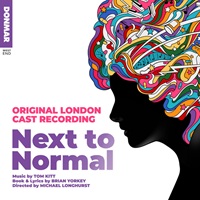
 (4.5 / 5) Almost 15 years after its Broadway bow, Next to Normal finally came to the West End, in a new production directed with searing intensity by Michael Longhurst. It first played at the Donmar Warehouse, transferred to Wyndham’s Theatre, then received a pro-shot video that aired a year later on PBS. Fans will quickly notice that this “cast recording” is simply the lifted audio of that video, with the audience response muted and, thankfully, Yorkey’s uncensored lyrics retained. As such, the balance of the music and vocals heard here is not as polished as one has come to expect from modern cast recordings, and since we have a primarily British cast, there are one or two faux-American accents that can be jarring. But even with those caveats, this is a thrilling recording. Thanks to singing actors who are vocally exceptional as well as emotionally raw, this Next to Normal pulsates with energy and feeling that practically seeps into your bloodstream. Leading the way is Caissie Levy as Diana. Levy starts out at a more subdued emotional and vocal level than Alice Ripley on the OBC recording, but she quickly builds herself into a manic frenzy, crashing into devastating brokenness, all while maintaining a soaring belt that gives the score a fresh exuberance. She’s equally matched by Jamie Parker’s gregarious Dan (though his American affect is perhaps the most egregious), as evidenced by their explosively combative rendition of “You Don’t Know/I Am the One.” Jack Ofrecio is sweet as the supportive Henry, and Trevor Dion Nicholas brings gravitas to the dual doctor roles. But the ultimate standouts of this recording are Eleanor Worthington Cox as Natalie and Jack Wolfe as Gabe. Cox feels like a weeping, open wound with a pristine singing voice, while Wolfe is more menacing as Gabe than Tveit had been in the original production, and he flies through his songs with a light pop sound that never feels mannered or put on. More balanced audio and some slight accent tweaking would have made this a perfect recording. But, in a way, being “almost perfect” makes Next to Normal even more stirring. — Matt Koplik
(4.5 / 5) Almost 15 years after its Broadway bow, Next to Normal finally came to the West End, in a new production directed with searing intensity by Michael Longhurst. It first played at the Donmar Warehouse, transferred to Wyndham’s Theatre, then received a pro-shot video that aired a year later on PBS. Fans will quickly notice that this “cast recording” is simply the lifted audio of that video, with the audience response muted and, thankfully, Yorkey’s uncensored lyrics retained. As such, the balance of the music and vocals heard here is not as polished as one has come to expect from modern cast recordings, and since we have a primarily British cast, there are one or two faux-American accents that can be jarring. But even with those caveats, this is a thrilling recording. Thanks to singing actors who are vocally exceptional as well as emotionally raw, this Next to Normal pulsates with energy and feeling that practically seeps into your bloodstream. Leading the way is Caissie Levy as Diana. Levy starts out at a more subdued emotional and vocal level than Alice Ripley on the OBC recording, but she quickly builds herself into a manic frenzy, crashing into devastating brokenness, all while maintaining a soaring belt that gives the score a fresh exuberance. She’s equally matched by Jamie Parker’s gregarious Dan (though his American affect is perhaps the most egregious), as evidenced by their explosively combative rendition of “You Don’t Know/I Am the One.” Jack Ofrecio is sweet as the supportive Henry, and Trevor Dion Nicholas brings gravitas to the dual doctor roles. But the ultimate standouts of this recording are Eleanor Worthington Cox as Natalie and Jack Wolfe as Gabe. Cox feels like a weeping, open wound with a pristine singing voice, while Wolfe is more menacing as Gabe than Tveit had been in the original production, and he flies through his songs with a light pop sound that never feels mannered or put on. More balanced audio and some slight accent tweaking would have made this a perfect recording. But, in a way, being “almost perfect” makes Next to Normal even more stirring. — Matt Koplik